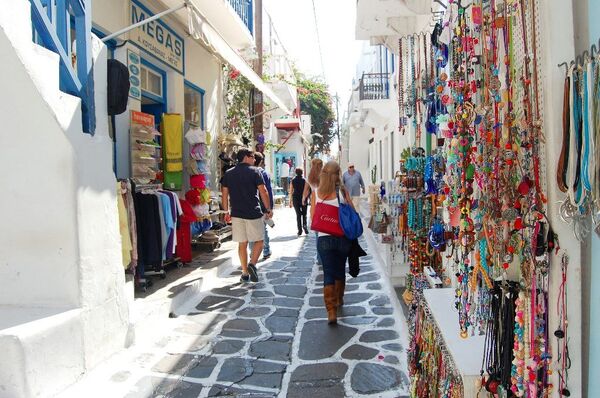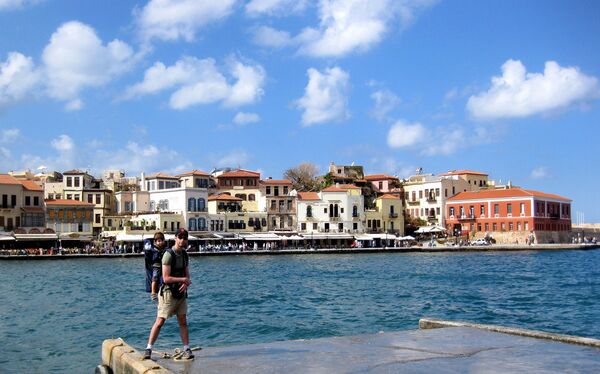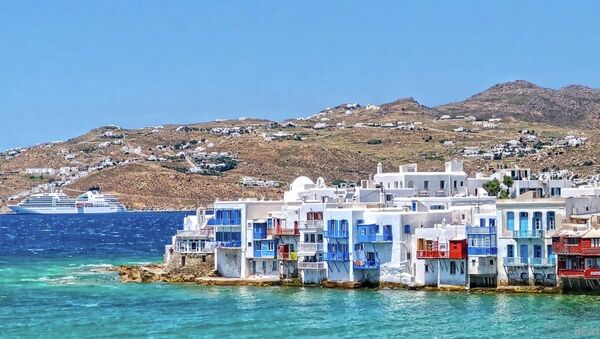Could tourists bound for a relaxing holiday in Greece be in for some trouble or is business as usual in a country facing an economic crisis — for now?
According to the World Travel and Tourism Council, tourism contributed $12.5 billion (€11.2bn) to the Greek economy in 2013 and is forecast to rise by 3.1 percent to $18.1 (€16.2bn) in 2024. Greece welcomed more than 22 million holiday makers in 2014.

According to Euromonitor International, the Mediterranean destination is first and foremost extremely popular among German visitors who make up the largest tourist group, closely followed by Brits, Russians and the French. But will the Greek crisis change all that?
The Greek minister of tourism, Elena Kountoura said: "Greece remains a popular destination for tourists all over the world. Tourists who are already here and those planning to come, will not be affected in any way by current events and will continue to enjoy their holiday in Greece with absolutely no problem."
Why are some tourists cancelling visits to Greece? Seriously weird and neurotic. It's not a war zone — just take a wad of cash with you!
— Daniel Hamilton (@danielrhamilton) June 30, 2015
An owner of a hotel on the island of Mykonos, one of the most popular destinations in Greece, told Sputnik:
"We are receiving emails from clients asking us what the situation in Greece is like and whether it is still a safe place, which of course it is. So once we reassure them they continue with their vacation as planned.
"However, some Greek people have canceled their vacation, especially those that had plans for the next few weeks," she said.
"We are all worried that things will get quite difficult if there is a currency change mid-summer. We hope it doesn't happen, because that would probably mean banks would stay shut for longer than expected — which will make everyday business transactions very difficult."
"But even if this does happen we are prepared to work harder to accommodate our clients and we'd like to reassure people that Greece is, and has always been, a safe place to travel and nothing is going to change that!
"So far nothing has changed, at least here in Mykonos, with the banks closed. This is because foreigners can still use the ATMs as they please and all places take credit cards."
However, the hotelier is expecting that some ATMs might run out of cash as advice given to holiday makers is to come with their credit cards to pay for the majority of their transactions, as well as bring lots of cash with them.

The advice from Britain's Foreign Office is to take more than one means of payment to Greece: "At this time, you can continue to withdraw up to you usual limit using a card issues outside Greece, as long as the ATM has been replenished." The Foreign Office advice is also to "make sure you take sufficient euros in cash" to cover the whole time you are on holiday.
Restrictions, recently imposed by the Greek government after Sunday's announcement of a referendum vote, allow citizens to withdraw €60 ($66.40) a day — a precaution to stop people from bleeding the banks dry.
A statement made by the Greek Ministry for Economy, Infrastructure, Shipping, and Tourism on Monday reassured foreign visitors that restrictions on cash withdrawals do not apply to foreign-issued debit and credit cards.
This was confirmed by the Greek Embassy in London, which said that the current bank restrictions "do not in any way affect those who wish to make transactions or ATM withdrawals using debit or credit cards abroad."
Greece: No withdrawal limits for debit or credit cards issued abroadThe Greek Government informs those visiting or…
Posted by Greek Embassy in UK on Monday, June 29, 2015
Over on another Greek island — Kos, a shopkeeper with a bright forecast told Sputnik that the banks might be empty, "but there's still plenty of sunshine.
"No one has cancelled the good weather", he said. "Despite the economic strains, businesses are trying to make the best of the situation and still accommodate tourists.
"Many tavernas are lowering their prices; some are practically giving meals away. The general feel among the islanders is not to let the current political mayhem affect our strongest asset — our tourism."


Capital controls imposed in Greece are likely to remain in place for months. Creditors say the door is still open to negotiators despite the Syriza government's decision to break off talks and put their latest cash-for-reform offer to the people in a referendum.
The shopkeeper on Kos told Sputnik that the islands are still open for business:
"We want to tell the world that Greece is still safe and beautiful, despite the political situation. The demonstrations are in Athens — not on the islands."
Instability in Greece’s economy and its future within the European Union appears to be insatiable. The Greek government has just proposed a two year deal with the European Stability Mechanism to cover the country’s finances by restructuring debt.
Many Greeks don’t know which way to turn, and many living on the islands fear the continuing political rhetoric.


